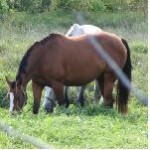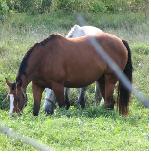Is Your Horse Getting Enough Hay… how would you know?

Do you feed by the ‘eye ball test’? You know the one. “I feed this much.” It may be 3 flakes, 2 flakes or half a bale. Or perhaps you eyeball the horse and think… Hhmmm he looks a little thinner today. Maybe I should bump up his hay/grain a bit.
Your horse should get as much hay to satisfy their daily requirements. The best and only way to do this is to get your hay analysed. Rural to your local feed supplier. They may be able to help you.
It a is recommended by veterinarians and horse nutritionists, horses consume at least 2 percent of their body weight in hay or pasture grasses and legumes each day. This means if your horse weighs 1000 pounds s/he should get 20 pounds of hay a day.
To me, this doesn’t sound like a lot. If a bale of hay weighs approximately 40 pounds that is only 1/2 a bale! Right now my guys are get 2 times that! A bale a day per horse.
Other Considerations When Feeding Hay
Horses should consume at least 1 percent of their body weight in hay or pasture grasses and legumes each day.
- Age of the horse. Mature horses performing minimal or no work can be maintained on high-quality forages without supplementing their diet with grain. Growing, breeding, or working horses require supplemental grain or concentrate to meet their additional nutrient requirements. Generally, for optimal horse growth and development, forages should supply onehalf or more of the total weight of feed consumed daily.
- Time of year. I have noticed when it is cold the horses eat more. Roughage often help keep the digestion moving and creates internal ‘heat’ which helps keep the horses warm during cold winter.
- Time the hay was harvested. When your hay was harvested will determine its quality. Poor harvest conditions will lead to poor hay. Good harvest conditions-good hay. Hay should be harvested just before it comes to seed, dried correctly and stored properly. Each step will ensure a good crop. If one step is missed the hay will lose some quality. Hay should never be moldy and dust kept to a minimum.
- What type of riding schedule your horse is doing. Horses in regular training may require more hay. And depending on the work the do, endurance horses and eventers, racing their hay intake will be closely monitored.
So… What does your feeding regime look like?

 Try these three powerful exercises to get strengthen your position.
Try these three powerful exercises to get strengthen your position.
